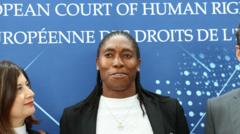Did the ECHR Violate Semenya's Right to Fair Hearing on Sex Eligibility Rules?

The Complex Journey of Caster Semenya: A Champion's Fight for Fairness
Caster Semenya, a name synonymous with excellence in middle-distance running, has not only dominated the track but has also become a symbol of resilience and the ongoing struggle for equality in sports. As a two-time Olympic champion and three-time world title holder in the 800m, Semenya's athletic prowess is undeniable. However, her journey has been marred by controversy and legal battles stemming from her differences of sexual development (DSD). In this article, we explore Semenya's complex situation, the recent legal developments, and their implications for athletes worldwide.
The Rise of a Champion
Caster Semenya burst onto the global athletics scene during the 2008 Beijing Olympics, where she made her mark as a formidable middle-distance runner. Born in South Africa, Semenya captured the world’s attention with her remarkable speed and strength. She won her first Olympic gold medal in 2012 and successfully defended her title in 2016, solidifying her status as one of the greatest athletes in her field.
Despite her accomplishments, Semenya's career has been fraught with challenges related to her biological differences. The International Association of Athletics Federations (IAAF), now known as World Athletics, began implementing regulations concerning testosterone levels in 2019, which directly impacted Semenya's ability to compete.
The Regulatory Landscape: Understanding DSD and Testosterone Levels
The regulations introduced by World Athletics aimed to create a level playing field in women's athletics, particularly in events ranging from 400m to the mile. These rules mandated that female athletes with DSD, a condition that results in elevated testosterone levels, must undergo medical interventions to lower their testosterone levels in order to compete in female categories.
The regulations have sparked a heated debate about fairness, discrimination, and the rights of athletes. Proponents argue that these rules are necessary to ensure fair competition, while critics, including Semenya, contend that they constitute discrimination against athletes with natural variations in their physiology.
The Legal Battles: Semenya's Fight for Justice
Semenya's struggle against World Athletics has been long and arduous. In 2019, she appealed the regulations at the Court of Arbitration for Sport (CAS), but her challenge was dismissed. This ruling marked the beginning of a protracted legal battle that would see Semenya fight not only for her right to compete but also for the rights of all athletes facing similar discrimination.
In July 2023, a significant development occurred when the European Court of Human Rights (ECHR) ruled in favor of Semenya concerning her right to a fair hearing. This ruling came after a complaint against the Swiss government's handling of her case, which was previously brought before the Swiss Federal Supreme Court.
The ECHR Ruling: Implications and Interpretations
The ECHR's decision emphasized that the Swiss ruling had not met the required standards for a fair hearing under Article 6 of the European Convention on Human Rights. Semenya expressed her satisfaction with the outcome, stating, "This is a reminder to the leaders [that] athletes need to be protected." Her statement encapsulates the broader implications of the ruling, which extends beyond her individual case.
Although the ECHR found in Semenya's favor regarding her right to a fair hearing, it ruled other aspects of her complaint inadmissible. Specifically, her claims under Articles 8 (right to respect for private life), 13 (right to an effective remedy), and 14 (prohibition of discrimination) were deemed outside of Switzerland's jurisdiction. This nuance highlights the complicated interplay between national regulations and international human rights standards.
The Broader Context: DSD Regulations and Their Impact on Athletes
The controversy surrounding DSD regulations is part of a larger conversation about gender, fairness, and the rights of athletes. Semenya's case has drawn attention to the challenges faced by numerous athletes with DSD and has raised questions about the criteria used to categorize athletes in gender-specific sports.
The Debate Over Fairness in Sports
On one side of the debate, advocates for the regulations argue that they are essential for ensuring a level playing field in women's sports. They contend that higher testosterone levels can provide a competitive advantage, and thus, regulating these levels is necessary to maintain the integrity of female athletics.
Conversely, critics argue that these regulations are inherently discriminatory. Many believe that natural variations in testosterone levels should not disqualify individuals from competing. Semenya is among those who assert that such rules reinforce harmful stereotypes and undermine the achievements of female athletes.
The Role of Sports Governing Bodies
Governing bodies like World Athletics play a crucial role in shaping the landscape of competitive sports. Their regulations must balance the need for fair competition with the rights and well-being of athletes. As seen in Semenya's case, the decisions made by these organizations can have profound and lasting impacts on individuals and the sports community as a whole.
The Future of DSD Regulations
With the ongoing legal battles and evolving societal perspectives, the future of DSD regulations remains uncertain. The ECHR's ruling may pave the way for further legal challenges and reforms within athletics. Semenya's case could potentially return to the Swiss Federal Court, setting a precedent for how the rights of athletes with DSD are treated in the future.
The Importance of Advocacy and Awareness
As athletes like Semenya continue to fight for their rights, advocacy and awareness are crucial. The conversation surrounding DSD regulations must include diverse voices and perspectives, ensuring that all athletes are treated with dignity and respect, regardless of their biological differences.
Conclusion: A Call for Fairness in Sports
Caster Semenya's journey exemplifies the complexity of gender, identity, and fairness in sports. Her legal battles have highlighted critical issues surrounding the treatment of athletes with DSD and the need for reforms within governing bodies. As the sports world continues to evolve, the principles of fairness, equality, and respect for athletes' rights must remain at the forefront.
In a rapidly changing landscape, it is essential for advocates, athletes, and governing bodies to work together to create an inclusive environment in which all athletes can thrive. The recent ECHR ruling serves as a reminder that the fight for justice and equality in sports is far from over. As we reflect on Semenya's story, we are left with a pivotal question: How can we ensure that all athletes, regardless of their biological differences, are afforded the opportunity to compete fairly and with dignity?
FAQs
What are differences of sexual development (DSD)?
Differences of sexual development (DSD) refer to a group of conditions where an individual’s reproductive or sexual anatomy doesn’t fit typical definitions of male or female. This can include variations in chromosomes, gonads, or hormone levels.
Why did World Athletics implement regulations regarding testosterone levels?
World Athletics implemented these regulations to ensure fair competition in women’s athletics by addressing concerns that higher testosterone levels could provide an advantage in certain events.
What was the outcome of Caster Semenya's case at the ECHR?
The ECHR ruled in favor of Semenya regarding her right to a fair hearing, indicating that the Swiss Federal Supreme Court did not meet the required standards. However, other aspects of her complaint were deemed inadmissible.
What impact does Semenya's case have on other athletes with DSD?
The outcome of Semenya's case may influence future legal challenges and reforms regarding DSD regulations, potentially improving the rights and opportunities for other athletes with similar conditions.
As we move forward, the conversation surrounding fairness and inclusion in sports will undoubtedly evolve. The fight for justice is ongoing, and athletes like Caster Semenya continue to inspire change, reminding us that the spirit of competition must always be grounded in equality and respect. #CasterSemenya #FairPlay #InclusionInSports
Published: 2025-07-10 10:41:02 | Category: sport



